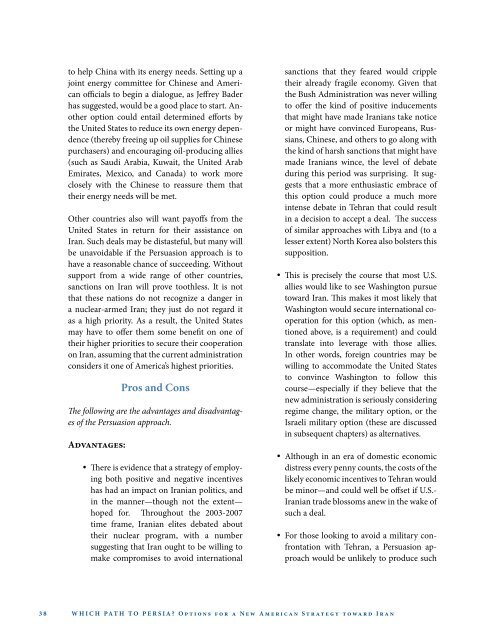WHICH PATH TO PERSIA?
You also want an ePaper? Increase the reach of your titles
YUMPU automatically turns print PDFs into web optimized ePapers that Google loves.
to help China with its energy needs. Setting up a<br />
joint energy committee for Chinese and American<br />
officials to begin a dialogue, as Jeffrey Bader<br />
has suggested, would be a good place to start. Another<br />
option could entail determined efforts by<br />
the United States to reduce its own energy dependence<br />
(thereby freeing up oil supplies for Chinese<br />
purchasers) and encouraging oil-producing allies<br />
(such as Saudi Arabia, Kuwait, the United Arab<br />
Emirates, Mexico, and Canada) to work more<br />
closely with the Chinese to reassure them that<br />
their energy needs will be met.<br />
Other countries also will want payoffs from the<br />
United States in return for their assistance on<br />
Iran. Such deals may be distasteful, but many will<br />
be unavoidable if the Persuasion approach is to<br />
have a reasonable chance of succeeding. Without<br />
support from a wide range of other countries,<br />
sanctions on Iran will prove toothless. It is not<br />
that these nations do not recognize a danger in<br />
a nuclear-armed Iran; they just do not regard it<br />
as a high priority. As a result, the United States<br />
may have to offer them some benefit on one of<br />
their higher priorities to secure their cooperation<br />
on Iran, assuming that the current administration<br />
considers it one of America’s highest priorities.<br />
Pros and Cons<br />
The following are the advantages and disadvantages<br />
of the Persuasion approach.<br />
Advantages:<br />
• There is evidence that a strategy of employing<br />
both positive and negative incentives<br />
has had an impact on Iranian politics, and<br />
in the manner—though not the extent—<br />
hoped for. Throughout the 2003-2007<br />
time frame, Iranian elites debated about<br />
their nuclear program, with a number<br />
suggesting that Iran ought to be willing to<br />
make compromises to avoid international<br />
sanctions that they feared would cripple<br />
their already fragile economy. Given that<br />
the Bush Administration was never willing<br />
to offer the kind of positive inducements<br />
that might have made Iranians take notice<br />
or might have convinced Europeans, Russians,<br />
Chinese, and others to go along with<br />
the kind of harsh sanctions that might have<br />
made Iranians wince, the level of debate<br />
during this period was surprising. It suggests<br />
that a more enthusiastic embrace of<br />
this option could produce a much more<br />
intense debate in Tehran that could result<br />
in a decision to accept a deal. The success<br />
of similar approaches with Libya and (to a<br />
lesser extent) North Korea also bolsters this<br />
supposition.<br />
• This is precisely the course that most U.S.<br />
allies would like to see Washington pursue<br />
toward Iran. This makes it most likely that<br />
Washington would secure international cooperation<br />
for this option (which, as mentioned<br />
above, is a requirement) and could<br />
translate into leverage with those allies.<br />
In other words, foreign countries may be<br />
willing to accommodate the United States<br />
to convince Washington to follow this<br />
course—especially if they believe that the<br />
new administration is seriously considering<br />
regime change, the military option, or the<br />
Israeli military option (these are discussed<br />
in subsequent chapters) as alternatives.<br />
• Although in an era of domestic economic<br />
distress every penny counts, the costs of the<br />
likely economic incentives to Tehran would<br />
be minor—and could well be offset if U.S.-<br />
Iranian trade blossoms anew in the wake of<br />
such a deal.<br />
• For those looking to avoid a military confrontation<br />
with Tehran, a Persuasion approach<br />
would be unlikely to produce such<br />
3 8 W h i c h Pa t h t o P e r s i a O p t i o n s f o r a N e w A m e r i c a n S t r a t e g y t o wa r d I r a n

















